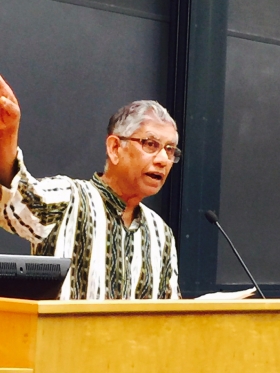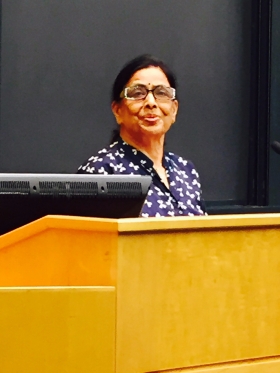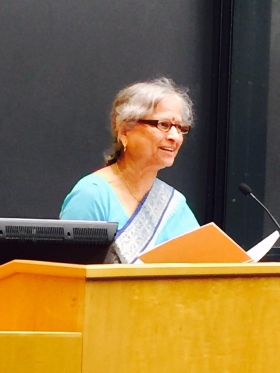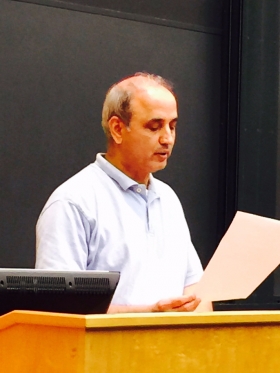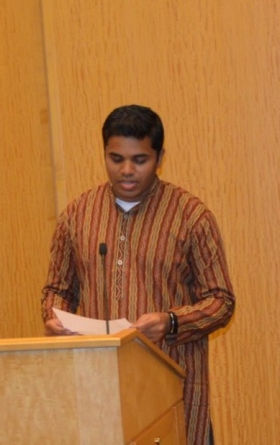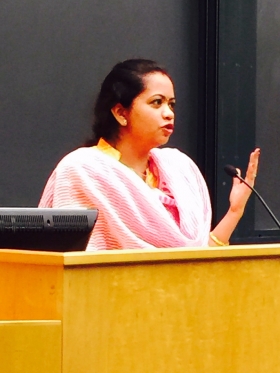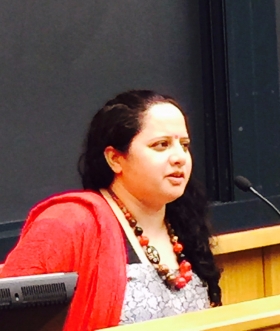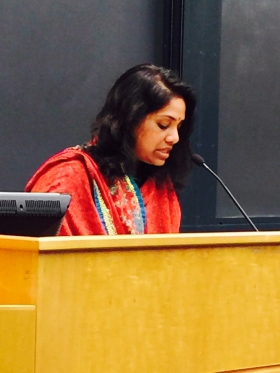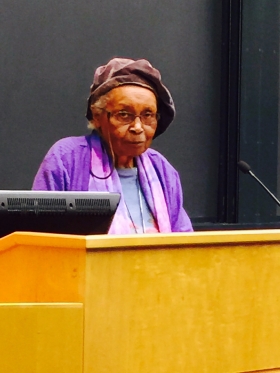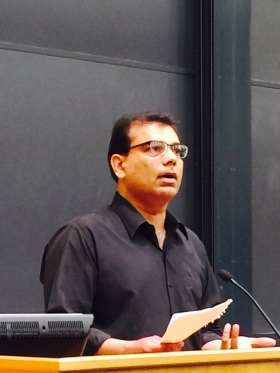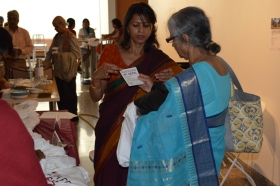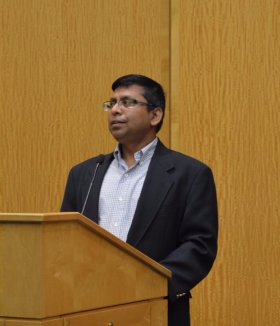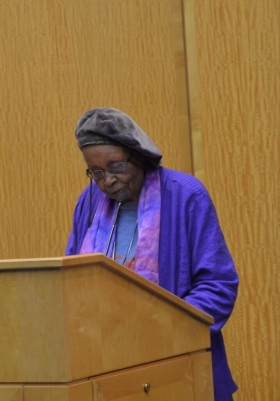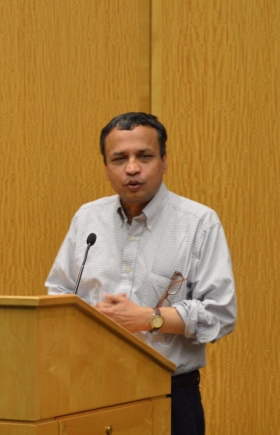By Sunayana Kachroo, poet participant
South Asia is a region of diversity with a peculiar synthetic cultural unity. Rich in history, languages, literature and philosophy, the region has explored the signature of humanity in man through religion, art, monuments, food, music, dance, and human conduct. So, what is the identity of a person belonging to South Asia but living far away from the native land? On May 10, 2015, thirty South Asian poets explored “Identity” at the Nineteenth India Poetry Reading session hosted by the South Asian Poets of New England, the South Asia Institute, and the Department of South Asian Studies of Harvard University.
The meeting began with the recalling of the tragic events in Nepal, where thousands perished through the massive earthquake in the Himalayas. The young land on the foot hills of the great mountain range is still forming, and the earthquake was a reminder that the earth is still moving underneath. Mr. Janmejay Shishupal read a poem especially composed for Nepal. Dr Shiva Gautam from the Medical School narrated the events from Nepal. Ms. Meena Hewett of SAI provided information about how people can support the Nepal Research and Reconstruction Fund. All joined in a one minute silence tribute to the deceased.
The poems were divided into three groups on the basis of their contents. The groups began with the cosmic connections exploring origins, followed by the terrestrial functionality of relationship and experiences, then finally individual perception of one’s personal characteristics.
The poetry event started with a narration of motherhood by a grandmother, Mrs. Nila Shah. Women maintain a hierarchy of roles in nurturing life. Relationships are the continuity in life. Her presentation was followed with a spirited presentation by Ruth Hill, the long-time oral historian and library staff at Harvard. Ruth and her late husband Dr. Hugh Hill “Brother Blue” were fixtures at the India Poetry event until Brother Blue passed away in 2009. Now alone, Ruth’s poetry presentation explored her journey through graduate school and employment at Harvard. Hers was a self-made journey with the assumption of new identities as time travelled. It was a lecture of warmth, affection and relationship.

Mr. Jaspal Singh, a Punjabi poet with deep identification to his nativity, presented his poem “Self,” and explained the Vedic teachings. All objects, phenomena, and formations are transitory and time-based. All identities are constructed eventually to disappear into non-being, in the play of being and non-being. He was followed by Mr. Manoj Panda, an Oriya poet. “Beyond Tranquility” traced one’s identity to the primordial origin, which leads to cessation of all contentions and culminates in peace and bliss within and beyond.
Gujarati poet Dr Pramod Thaker “Krishnaditya” followed with “I,” an interpretation of individual identity: “I am not so rough, I am not so soft. Whatever I have saved, I offer you with my soul!” Mr. Subhash Sehgal, a passionate Urdu poet, read the poem “Panchhi.” Poetry believes that everyone’s identity is God himself because it is God that creates, protects, and destroys everybody. Dr. Madhukar Shah presented a beautiful rendering of “Shadow.” Our external manifestation is indeed the shadow of our inner self. Hindi poet Mr. Rajesh Tyagi explored the theosophical aspects of identity that could include our ancestry and the genetic makeup.
Ms. Jamunabai Prakash opened the second segment of the event with her English poem “Love’s Labor Won.” Following the Sanskrit poet Kalidasa in his epic Kumarasambhavam, she argued that love is a process of creativity. She was followed by the Bengali poet Ms. Maya De with her poem “My Identity.” Next was the Hindi poet Mr. Sanjeev Tripathi. He said the goodness in man is an imaginary quantity; one explores goodness through experience.
Dr. R. Balachandra presented the English poem “Turkeys in My Yard.” How does a man distinguish himself from a turkey? Can he? Are they not same in the cosmic world? Poet Ms. Paromita De presented a sweet poem about how technology has helped new identities by bringing people closer, although located far away. Dr Shiva Gautam’s Nepali poem “Anamel” was a tragic tune that brought tears to the listener.
Dr. Bijoy Misra gave an analysis of sorrow in an Oriya poem “Identity of Sorrow.” Sorrow is hidden in human egotism and aggression. His was followed by a Punjabi poem “Who Am I” by Mr. Amandeep Singh. The Gujarati poet Mr. Chandrakant Shah recited a poem, “Who am I,” from his published book “Blue Jeans.”

The eminent Bangladeshi poet Dr. Sajed Kamal opened the third segment of the event by reciting a poem in English, “Coming Home, America.” Written more than thirty years ago, the poem narrates the struggles of an immigrant in the melting pot of the American mosaic: “There are human beings who still love life and this earth, and they still keep on singing!”
Alok De read his Bengali poem “Identity.” He observed that the identity is a constantly changing concept, with different meanings in time and space. Neena Wahi recited her Hindi poem “Lost identity,” a stark portrayal of the journey of the identity loss that many people experience through the naturalization process in the USA. The attire changes, the language corrupts, but the skin color reveals the true identity!
After reading some verses to honor mothers, Sunayana Kachroo recited her Hindi poem “I finally learnt,” a satirical take on the identity crisis one might face due to the over-consumption of social media or loss of parental guidance/support and values, owing to the nuclear family structure.
Rupendra Guha-Majumdar, a visiting Fulbright faculty from India, read a very poignant and soul-stirring English poem titled “Boys will be Boys.” It pointed to the recent shooting of schoolboys in Pakistan, resulting from a confused notion of political identity. Manoj Mishra read his Hindi poem “Kya Likhoon” describing the brutalities that the people in the Tribal areas endure in the on-going conflict. The army and the insensitivity of the successive governments have only resulted in a deepening of their trauma and suffering.
Punjabi poet Preetpal Singh presented his poem “It was fun,” which transported everyone to their fun-filled childhood days, where happiness was not complicated and even insignificant and senseless actions resulted in unlimited entertainment. Achyut Adhikary recited a poem in Nepali entitled “Speech.”
Pallika Kanani concluded the program with a thought-provoking Gujarati poem “Code Switch,” an ironic take on the changing structures of the spoken language because of globalization. The afternoon ended with friendly warmth, joy, and laughter.
South Asian Poets of New England (SAPNE), the group that organized the event, meets every quarter. More information: http://www.southasiapoets.wix.com/sapne.
All writers are requested to contact Dr Bijoy Misra at bmisra@fas.harvard.edu or Mr Chandraknat Shah at bostonwale@gmail.com to participate in the SAPNE poetry reading events.
More photos:



